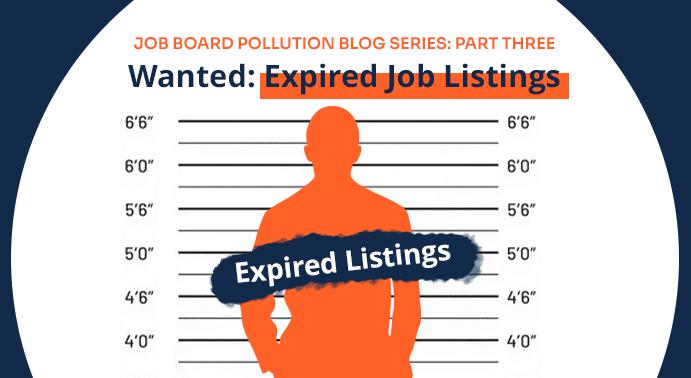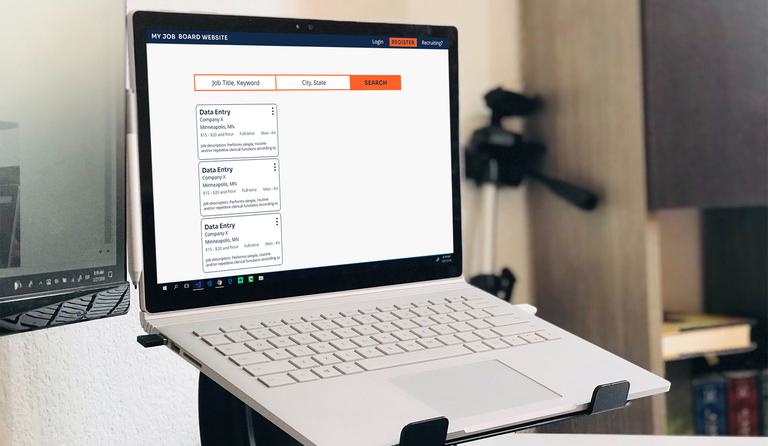Job Board Data Pollution: Expired Listings Slow Data Down (Part 3)
In our Job Board Data Pollution series, we discover the impact of expired job listings on job boards and their detrimental effects on job data accuracy.

We’ll admit some things stay useful after their expiration date–pickles, usually, and your driver’s license (at least at the bar). Depending on your taste, some yogurt only starts getting good after the sell by date, and of course we all know the story of cheese.
But expired job listings–listings for open jobs that have already been filled or otherwise withdrawn–are all sour and no tang. They are to be tossed without delay. And yet if you’ve ever spent time on an online job board, you’ll have noticed expired listings by the hundreds: zombie jobs parading as the real thing, giving job seekers endless agita and job data analysts an inaccurate reading of the labor market.
Remember that job that Company X needed to hire for in our last post? How we watched it mutate from a single, organic job on Company X’s website into a vast legion of duplicate listings on job boards all over the web?
Well, all the clicks bore fruit. Company X made their hire. Now they’ll remove the listing from their website, and with some urgency. Hiring managers don’t want to frustrate candidates by listing a job that’s already been filled–to do so would risk the health of the company’s employment brand, a factor that’s been increasingly important in the hiring landscape, especially when the labor market is tight. When jobseekers expend the effort of applying to a job only to learn the listing is outdated, they forge negative associations with the company who sold them on an expired bill of goods. HR departments also don’t want to annoy hiring managers by having them continue to receive applications or candidate alerts after the rec has already been filled.
Bottom line: hiring managers want the job listings on their website to be current. Of course, they want the same for their listings on job boards, but as we’ve seen, those listings are often not in their control. Frankly, they’re not really in anyone’s control. Whether a sponsored listing on a job board is paid by click or for a given term, the mechanism to remove the listing is, at best, deeply flawed.
If a job is filled on day 7 of a 30 day advertising term, the expired listing will remain posted on the job board, appearing to still be open, for three additional weeks. When it comes to the listings that have been scraped and syndicated across multiple job boards, the problem is worse. These duplicate listings are often distorted and materially changed as they’re copied via automation–inaccurate location, job description, even company name–which makes the job of recalling them all next to impossible. In many cases, employers aren’t even aware that their listings are cross-syndicated by job boards, who are hungrier for a high volume of listings than for accuracy or timeliness. Recently, industry experts have estimated between 10-15% of listings on job boards link to jobs that have already been filled.
If the first problem is that job boards fail to remove job listings that have expired, another is that they often do remove listings for reasons other than being fulfilled by a hire. Maybe recruitment marketing dollars were reallocated, or the listing was moved to a more regional, targeted board; the listing may have been removed after being inappropriately flagged as spam when it was, in fact, real. Either way, the maintenance of listings on job boards is abysmal.

How does this get in the way of timely, actionable data and strong predictive power? If you want to predict how many hires a company will make or how many new jobs the U.S. created in a given period, you need to know how many actual, real jobs are open, precisely how long they were or have been open, how many have been removed and when.
At LinkUp, we track not just the number of jobs that are listed on company websites, but also the average number of days a job remains listed before it is filled and removed. This calculation, what we call ‘Closed Duration,’ is often called ‘time-to-fill’ in the HR world and serves as a robust indicator of hiring velocity. In addition to the number of jobs added to companies and the broader workforce, closed duration signals how quickly or slowly hires are being made, indicates the confidence on either side of the labor equation, and gives us the analytical tools necessary to make strong predictions about where the job market is moving in real time.
We can be confident in our analysis of data signals like hiring velocity precisely because we pull job data directly from company websites, where jobs are listed and removed in a timely manner, according to the reality of hires needed and hires made.
Job boards simply cannot make the same claim. Clogged with expired jobs and beholden to flawed mechanisms of job listing removal, they are unable to communicate timely and accurate hiring intel. This, in addition to the fraudulent and duplicate listings polluting these job sites, disqualifies them as providers of reliable data.
Now you’re familiar with the problem of data pollution on job boards. Next week, we’ll take you through LinkUp’s solution–our unique approach to data quality that directly leverages company websites to cut through the noise of bad signal and deliver on our mission: to empower our clients with the most actionable and predictive job market data available, anywhere.
Job Board Data Pollution Blog Series:
Job Board Data Pollution: An Introduction
Job Board Data Pollution: The Nefarious Underworld of Fake Jobs (Part 1)
Job Board Data Pollution: How Duplication Bloats the Labor Market (Part 2)
Insights: Related insights and resources
-
Blog
11.17.2023
Job Board Data Pollution: How Duplication Bloats the Labor Market (Part 2)
Read full article -
Blog
11.15.2023
Job Board Data Pollution: The Nefarious Underworld of Fake Jobs (Part 1)
Read full article -
Blog
11.09.2023
Job Board Data Pollution: An Introduction
Read full article
Stay Informed: Get monthly job market insights delivered right to your inbox.
Thank you for your message!
The LinkUp team will be in touch shortly.
